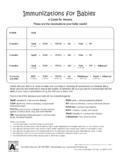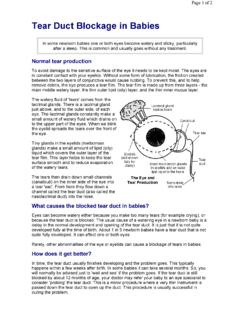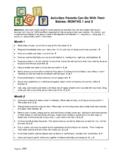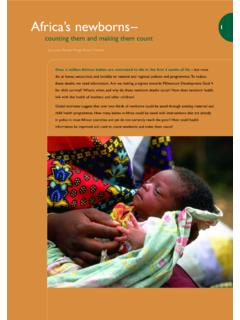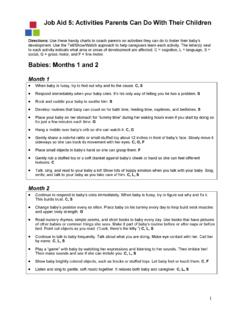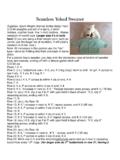Transcription of Common Problems of Babies with Trisomy 18 or …
1 Common Problems of Babies with Trisomy 18 or Trisomy 13. (Revised 2012). By Ann Barnes, RN, mother of Megan, who had Trisomy 18 (7/8/85 12/29/04), and John , MD, MPH, pediatrician and geneticist, co-founder and medical advisor for SOFT. Reviewed by: Scott Showalter, MD, MPH, pediatrician, SOFT professional advisory board and father of Patrick, who had Trisomy 18 (2/6/87 4/18/87). Parents often learn from other parents. For nearly three decades, new parents and seasoned parents of the Support Organization for Trisomy 18, 13 and Related Disorders (SOFT) have shared information about their child with these syndromes at SOFT conferences, in newsletters and now on Facebook.
2 A. consistent list of Problems and concerns has been reported by parents through the years. Viability of their newborn is their first concern, followed by decisions about management of care. Feeding difficulties and constipation are Common , often lifelong Problems ; care of infants with these issues follows below. There is a high frequency of cardiac abnormality in both disorders, and other internal or external abnormalities often occur. Congenital heart disease, apnea (interruptions in breathing) and risk of pneumonia are Common and can be life-threatening. with time, motor and mental delays become apparent and chronic health issues such as seizures can develop. The care of infants and children with Trisomy 18 or 13 is complex and usually involves many specialists as well as a primary health care provider.
3 Feeding difficulties Newborns too ill or premature to feed are sustained temporarily by intravenous (IV) nourishment until they are able to tolerate feedings. Most infants with Trisomy 18 or 13 begin life with feeding Problems related to difficulty coordinating their breathing, sucking and swallowing, and often experience choking and sometimes vomiting. Reflux (the upward movement of small amounts of stomach contents into the esophagus or throat), aspiration (inhalation or trickle of fluids into the lungs), and oral facial clefts further contribute to feeding difficulties and health issues. If appropriate, a baby with these issues might be referred to a dysphagia clinic or feeding specialist to help with feeding Problems , or to a gastroenterologist for evaluation.
4 When feeding orally (by mouth): Ask the nursery staff to show you how to position your baby's head up, in good body alignment, because hyperextension of the head, a usual position of infants with Trisomy 18 or 13 who have not yet developed head control, makes swallowing more difficult. Keep your baby's head elevated about 30 degrees or more during feeding and, if possible, about 30 minutes or more after, while digestion occurs, to help decrease possible reflux. Try feeding with pre-softened preemie nipples and give only small amounts, offered frequently. The help of a lactation consultant will likely be needed, to breast feed. More often than not, these infants are unable to be fed by breast or bottle; however, some parents reported success with bottle feeding, and more than a few reported successes with breast feeding.
5 Ask the nursery staff to show you how to burp your baby during and after feeds. Babies with oral facial clefts usually require special nipples and instruction from the nursery staff. The Haberman feeder (now called Special Needs feeder) is noted for this purpose in Trisomy 13, A Guidebook for Families; a parent handbook, which is available for purchase on the SOFT website. Medela, Inc. makes these feeders and can be contacted at 800-435-8316. Because of feeding issues, most Babies with Trisomy 18 or 13 are fed by a nasogastric ( ) tube inserted through the nose, or an orogastric ( ) tube through the mouth, down through the esophagus into the stomach. Some Babies eventually learn to coordinate their suck and swallow, but Dr.
6 John C. Carey, medical advisor for SOFT, notes that those not able to do so by about 6 months of age, are unlikely to progress to bottle or breast feeding. Eventually many parents opt to have a gastrostomy tube (G-tube). placed abdominally. Some Babies and children are fed only by tube; others are fed both by mouth and by tube. Some parents feed their Babies and children only by mouth. A few parents report that their older child has/had some self-feeding skills. Reflux Reflux, a frequent problem in infants and children with Trisomy 18 or 13, is usually treated with medication prescribed by a doctor, but referral to a gastroenterologist may be needed if reflux persists.
7 The American Academy of Pediatrics recommends that healthy infants sleep on their backs to decrease the risk of sudden infant death syndrome (SIDS). But reflux can cause pneumonia due to aspiration so it is important to ask the doctor what sleep position is safe for your baby. Some children with reflux need consideration of surgical correction. Prior to any surgery, a cardiac evaluation will be needed to determine the safety of doing the procedure. The most frequent surgery done for Babies and children with Trisomy 18 or 13 is placement of a gastrostomy tube for feeding. The SOFT Surgery Registry maintains a list of surgeries reported by parents on the SOFT membership forms.
8 This list can be seen on the SOFT web site in the Family Support section at the bottom of the home page and in the "Professionals" tab of the main menu. Slow growth Children with feeding difficulties and cardiac Problems grow slower and in general are smaller than other children. Ask your doctor about formulas or supplements to help your baby gain weight. A. referral to a nutritionist might be helpful. Growth charts for children with Trisomy 18 or 13 were published in 1994; a number of participants in this study were from SOFT. These charts are available on the SOFT website, to copy and add to your child's medical record for use in monitoring your child's growth in comparison to others with the same disorder.
9 Irritability and constipation All Babies cry but frequent crying and fretting is stressful for parents. Some infants might be experiencing colic (crying for no apparent reason) but a Common problem of infants with Trisomy 18 or 13 is discomfort due to gas, constipation (firm stool) or difficulty in emptying their bowel, no matter what the consistency of the stool. Feeding Problems make it difficult for an infant to get enough nourishment for comfort and growth which in turn results in the baby waking because of hunger. Crying, fretting and feeding Problems contribute to a baby swallowing air and any baby experiencing the bowel discomforts mentioned above will be less willing to eat.
10 Ask your doctor: about anti-gas medication and give it enough time to work by using it consistently, as directed. for a baby formula that helps form soft stool. for advice about stool softener medication (frequently needed). about using Pedia-Lax (formerly Babylax). Pedia-Lax is a liquid glycerin suppository designed to relieve occasional constipation for the 2 to 5 year old; consult with the doctor for those under 2 years. Dr. John C. Carey, medical advisor for SOFT, advises all parents to check with the doctor before using Pedia-Lax. Caution: Enemas can deplete a baby of electrolytes and alter body fluids in children. Enemas should only be used with caution and under the guidance of a physician.

